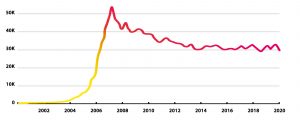Wikipedia is one of the most popular websites on the planet. In terms of popularity, its worldwide ranking fluctuates between the 15th and the 5th most popular site. It trails behind search engines and some social media sites. But in the realm of content, Wikipedia surpasses all other websites by wide margins.
Wikipedia’s popularity and its unchallenged leadership in the organization of human knowledge make it more than just an “online encyclopedia.” The website is regularly consulted by students of all levels, by journalists and book writers, and even by courts and politicians. It influences virtually all new content being created in the world today. It impacts the worldviews of a substantial number of people. Ironically, then, not many readers know how Wikipedia works and who Wikipedia writers are.
The most striking fact about Wikipedia is that most of its content is created by a large group of Wikipedia writers (also called Wikipedia editors or Wikipedia volunteers) who receive neither monetary benefits nor recognition outside of the Wikipedia ecosystem. Thousands of people pour hundreds hours a month into the encyclopedia. They create new articles from scratch and improve existing articles, all for nothing. You have to be an advanced Wikipedia user even to know how to determine the mere nickname of a primary contributor to a Wikipedia article. Some of these editors might be getting into trouble with their bosses, spouses, or friends for not putting enough hours into their daily jobs, family, or social activities, but they work on the online encyclopedia anyway. Why do Wikipedia writers do this?
Over the years, two different explanations of the encyclopedia’s success have emerged. The most basic explanation focuses on innate altruism and the ability of human communities to self-organize in the absence of any centralized structures. For example, The Wikipedia Revolution, by Andrew Lih, and How Wikipedia Works, by Phoebe Ayers, assert that this altruism and self-organization have led to the six million Wikipedia pages in English and six million more in other languages.
Others disagree. For example, in his book Cyber Chiefs, Australian sociologist Mathieu O’Neil paints a picture of Wikipedia as a collection of “online tribes.” In this alternative model, Wikipedia’s creation is a shrewd online game in which the players—Wikipedia writers—compete. The prize is the satisfaction of outsmarting your opponent with better research abilities, more skillful sentence-drafting, deeper knowledge of the policies, rules, and arbitration precedents, or all of the above. It follows that the millions of articles are just a byproduct of this game.
This second model may sound grotesque to Wikipedia editors themselves, who would rather ascribe their actions a noble, altruistic motive rather than a mere urge for gaming (albeit intellectual gaming). However, the model does explain why the Wikipedia community matches typical gaming communities in gender and social composition. For example, despite perennial efforts of Wikimedia Foundation to attract more woman editors, the Wikipedia community remains a predominantly male and a markedly aggressive environment.
At Wenard, we believe both explanations have merit. Certainly, the internal environment of Wikipedia appears surprisingly unwelcoming. It is perhaps a more rancorous environment than an altruistic newcomer would expect. In earlier years, rookies were warmly welcomed and nurtured. But once the significance of Wikipedia and its key “game” rules were established, newbies have been mercilessly “nullified.” In the early days, a newbie would get some handholding, a token of appreciation for an unsuccessful attempt to make an edit, and a walkthrough on how to improve it. Now, a limp edit is usually destroyed, leaving the newbie  showered with barely comprehensible references to arcane Wikipedia policies. Unsurprisingly, this inhospitable behavior has had an adverse impact on the quantity and quality of new Wikipedia editors. The graph depicts this change over time.
showered with barely comprehensible references to arcane Wikipedia policies. Unsurprisingly, this inhospitable behavior has had an adverse impact on the quantity and quality of new Wikipedia editors. The graph depicts this change over time.
On the other hand, many Wikipedia participants want to contribute more peacefully. They sidestep major battlegrounds and quietly add more and more articles in non-contentious areas. Many run “bots” that carry out automated improvements that are unrelated to the battles around them. We estimate that this group of editors creates significantly more new Wikipedia pages than the editors who are fixated either on jealously patrolling momentary status-quos within contentious topics, or on battling them full steam.
The bottom line is that if you want to contribute to Wikipedia today, you need to grow thick skin. Despite multiple declarations to the contrary, you must invest substantial time and familiarize yourself with a lot of rules and regulations before you can even begin. The endless yammering that Wikipedia is non-hierarchical community is untrue. It’s a full-fledged hierarchical meritocracy, and as any hierarchy can become corrupted over time, so occasionally does Wikipedia. Not every administrator you encounter will be acting in Wikipedia’s best interests. You must learn and understand how the hierarchy works, the rules for navigating it, and your place in it.
There are over one thousand Wikipedia pages that lay out its current policies! What makes things particularly difficult is that many experienced editors of the aggressive tribe do not follow the letter and spirit of those policies if they know they can safely overpower you. At most, their bullying may result in a warning—if you can even get the attention of administrative staff. The more popular topic you take on, the more “hazing” you can expect. Don’t expect any community gratitude or new friends.
On the other hand, this process works, and it has been extraordinary successful. The resulting rigorous, sometimes waspish review of contributions, coupled with the author’s ability to stand their ground when right and yield when wrong, supports the accuracy, completeness, and non-biased quality of the resulting content.



